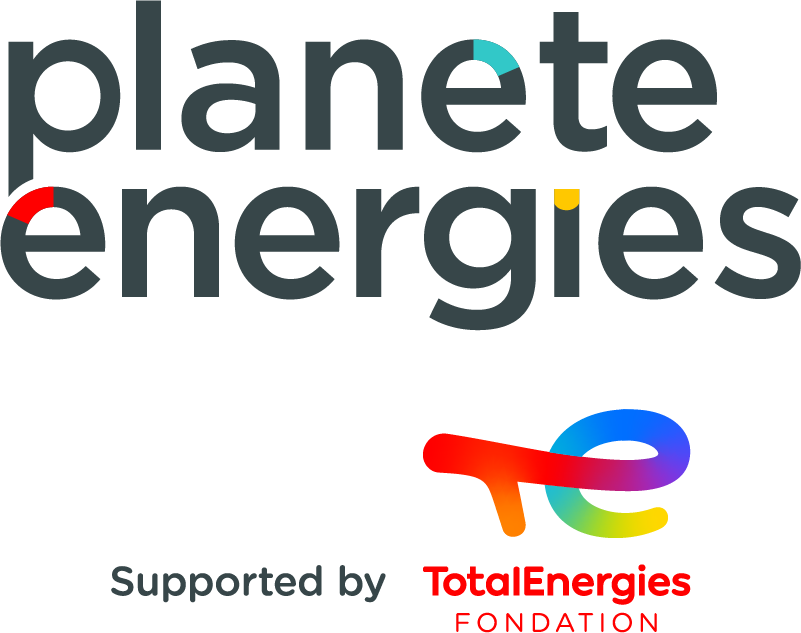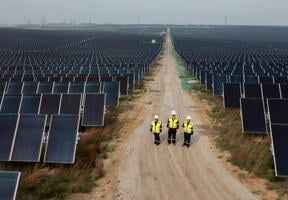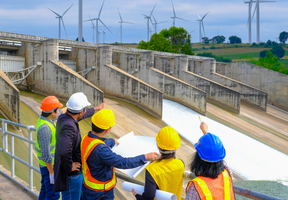Is Africa the Continent of the Future?
10 min read
Experts unanimously agree that after years of fairly slow development Africa is now undergoing rapid growth. The pundits, however, are divided into two categories: the Afro-optimists, who believe that Africa is set to become the continent of the future, and the Afro-pessimists, who believe that poverty-related tensions will only get worse. But thanks to Africa's bright energy prospects, particularly in the field of solar electrification, the scales could tip in favor of the optimists. A few key issues are described below.

© Thinkstock - One out of every four people on Earth will live in Africa in 2050 – a challenging situation, but one that offers fantastic potential. Here we see a marketplace in Jimma, Ethiopia.
Africa Drives World Population Growth
The number of inhabitants in a country, or a group of countries, continues to be a factor of . China is a prime example. Africa currently has a population of nearly 1.2 billion people, or 16% of the world total, a figure that is expected to double by 2050, bringing Africa's share of the global population to 25%. The child population will experience significant growth. By 2050, 40% of all children under five will live in Africa, according to a UNICEF report. Nigeria alone will account for 10% of all births in the world. On the negative side, the rural exodus and city/country imbalance resulting from the demographic boom will pose a threat to agriculture and food resources.
Low Consumption of Energy But Rapidly Rising Needs
Over 600 million people, i.e. two out of three Africans, still do not have access to modern energy sources. Excluding South Africa, sub-Saharan Africa's per-capita power consumption averages 162 kilowatt-hours (kWh) per year, compared to a global average of around 7,000 kWh. Africa accounted for less than 4% of global greenhouse gas emissions in 2015. But will the continent be able to pursue a sustainable, low-carbon growth strategy at a time of skyrocketing energy needs due to economic, demographic and urban growth?
A Wealth of Energy Potential
Africa has considerable energy resources, including 8% of the world's oil reserves, 7% of its natural gas reserves, 4% of its reserves, 10% of its hydropower potential, 17% of its reserves, 15% of its potential, 38% of its resources and an average of 300 days of sunshine per year (figures presented at the 2015 Energy Trilemma Summit in Addis Ababa1).
Is A Direct Pathway to a Low-Carbon Economy Possible?
Owing to the continent's vast potential, as well as global awareness of the need to address , some experts believe that Africa will not have to follow the same energy path as the industrialized world and will be able to transition directly to a low-carbon economy. According to estimates presented in early 2016 by Akinwumi Adeesina, President of the African Development Bank (AfDB), African energy production from renewable energy sources would break down as follows: solar (11,000 gigawatts - GW); hydroelectric (350 GW); wind (110 GW) and geothermal (15 GW)2.
Africa's abundance of raw materials
Africa is rich in natural resources, but cannot rely on them alone for its economic development. According to experts, the African continent holds 40% of the world's gold reserves and 30% of reserves of essential minerals: iron, copper, aluminum, platinum, chromium, lithium and other rare metals that are increasingly essential to the development of renewable energies and electric cars. Africa is also a producer of sought-after plant raw materials (oilseeds, coffee, cotton).
But an abundance of raw materials does not always translate into sustainable economic development. Firstly, the instability of commodity prices makes income fluctuating and uncertain. Secondly, the financial windfall they provide is often a source of corruption, and does not encourage economic diversification and forward-looking investment. The challenge for Africa is to strengthen its infrastructures, develop its local industries and engage in sustainable innovation.
Leapfrogging
Many economists believe that Africa will be able to leapfrog to advanced technologies without having to follow the path traditionally taken by industrialized countries. Take, for example, the telephone. Africa has bypassed traditional landline technology and gone directly to mobile phone use, which is expanding rapidly (nearly 500 million users out of 1.2 billion inhabitants). In the same way, Africa could significantly speed the electrification of the continent by leapfrogging to distributed (decentralized) solar generation, while reducing the need to build power distribution grids connected to each village.
Sources :
- World Energy Council
- Interview in Jeune Afrique – Ils feront l'Afrique en 2016 – Special issue No. 4















